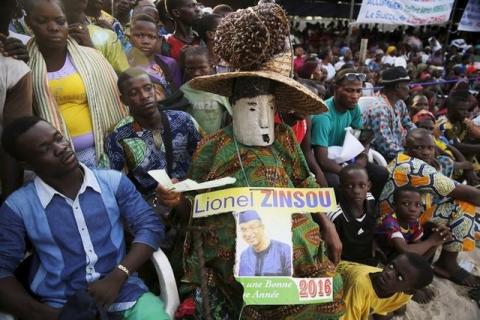Advertisement
Benin to choose new president amid economic, logistical concerns
COTONOU (Reuters) - Benin will vote for a new president on Sunday in a crowded race focused on boosting the flagging economy, though logistical problems may keep hundreds of thousands from casting their ballots.
Current President Thomas Boni Yayi is stepping down after two terms at the helm of the small West African cotton-producer, leaving 33 candidates vying to replace him.
Benin has not seen the levels of political tension that have plagued other recent votes across the continent, including in Burundi and Rwanda where leaders have tested constitutional limits to stand for a third term.
But there are concerns frustrations could rise because of delays in distributing voting cards that have already held up the vote by one week.
"The problem is that many of the old cards had problems that weren't addressed," said Fidele Marcos Kikan, who heads Amnesty International's Benin branch. "I myself have not received my card so I cannot vote. There are many people who cannot vote."
Campaigning has centered largely on the unemployment, education and economic growth which has slackened as plummeting oil prices hit Benin's much larger neighbour and main trading partner, Nigeria.
JOBS, SCHOOLS
Leading the field is Prime Minister Lionel Zinsou, a former economist and investment banker who has received public backing from both the president and the main opposition Democratic Renewal Party (PRD).
He faces strong opposition inside the ruling Cowry Forces for an Emerging Benin (FCBE) party and from trade unions who say that, having spent much of his life away from Benin's politics in France, he is an outsider and a poor choice to lead.
Other top candidates include ex-prime minister Pascal Irenee Koupaki, Abdoulaye Bio Tchane, a former senior official at the International Monetary Fund (IMF), and prominent businessmen Sebastien Ajavon and Patrice Talon.
Tchane has promised to create 500,000 jobs every year of the five-year term. Ajavon says he will reduce youth unemployment through the creation of business incubators. Zinsou and Talon have both pledged to reform Benin's education system.
"Education is a pillar of development that must be addressed with great interest, with the goal of responding to the standards of the labour market," Zinsou told teachers at an event in southern Benin, according to his website.
As of Friday, voter identification cards had not been distributed in two of Benin's 12 administrative districts, where nearly 700,000 voters live.
"I am discouraged and I think many people are in the same boat," said Elie Dossou, a resident of the economic capital Cotonou who has tried and failed to pick up her voter card.
If no candidate wins an outright majority in the first round of polling on Sunday, the top two finishers will progress to a run-off vote within 15 days.
(Writing by Makini Brice; Editing by Edward McAllister, Joe Bavier and Andrew Heavens)



















Add new comment